3 Dec 2012
Last Shop Standing: the rise, fall and rebirth of the independent record shop: an interview with Graham Jones
I recently watched a fantastic documentary, ‘Last Shop Standing: the rise, fall and rebirth of the independent record shop’ and found it very inspiring. Here is the trailer:
It’s fantastic. Get a copy. It made me wonder whether the recent revival of independent record shops have a few things to teach us more generally about vibrant local economies? As a vinyl junkie and as someone who grew up in independent record shops, I wanted to explore some of the issues in the film in more depth. I was therefore delighted to be able to start out by interviewing Graham Jones, author of ‘Last Shop Standing’ and presenter of the film. As lovers of music, vinyl and independent shops we could have talked all day, but luckily for you we kept it brief.
Graham has worked for many years as a record salesman, visiting record shops up and down the country, and was moved to write the book after seeing more and more independent record shops shutting their doors and going out of business.
I began the interview with a quote, from the film, from Johnny Marr (former guitarist in the Smiths, see above):
“There seemed to be this idea that record shops disappeared because people didn’t want to buy vinyl, when I wonder if it isn’t the other way round, because people don’t buy vinyl because their record store’s disappeared”.
I asked Graham what were some of the key drivers behind the decline of independent record shops. “One of the key ones”, he told me, “was the vast abuse from Jersey where stuff was being sent from the Channel Islands by the online retailers VAT free. They weren’t paying VAT on anything under £18, and one thing I try and point out is that that has been the silent killer of the high street because it gave the online retailers a 20% advantage on people trading on the high street. That loop hole was closed this year but the damage had been done. Hundreds of shops have closed and that’s had a major contribution to it.
I grew up in independent record shops. Revolver Records on the Triangle in Bristol was my second home really from 14 onwards. How, for you, does the quality of shopping in an independent record shop vary from going to a big chain retailer like HMV?
The difference is choice. I recently did a talk in Frome and the independent record shop there, between two stores they have 120,00 different titles on CD, DVD, LP single, even cassette, you know the choice they offer. The other choice in Frome was ASDA, where I went in to check before I came down, who offer you 200 different CDs of which they didn’t have a single folk CD and their jazz section consisted of The Best Jazz Album in the World…Ever and that was it.
That’s what independents give you, they give you choice. It’s also the fact that when you go into an independent record store 50% of their sales are impulse purchases, it’s where people will just flick through the racks or see something at a bargain price or speak to the owner. When a record store closes, you lose 50% of those sort of sales in that town.
I love it when Martin Mills of the Beggars Group, says in the film “we’re not trying to sell people what they want, we’re trying to sell people what they don’t want … yet”.
That is so true, because that’s what we do and that’s what independents do. The great thing for me about independents, and this applies to all independent businesses, is they support local music, local bands, sell their tickets, in many cases they’re putting on performances by the local artists. There was something in the book that struck home with me.
There’s a shop called Spillers in Cardiff and I asked them what was their best seller. They told me it’s a CD called Twisted by Design, which I was unaware of, and they’ve now sold nearly 1000 copies of this CD. It’s a compilation of local Cardiff bands. You’d never get that support from HMV or Tesco. All that new music and local music wouldn’t have been introduced to people without the independent record store.
One of the things that watching your film inspired in me was for me to get my turntable out and rig it up in the kitchen, and I’ve been rediscovering all the stacks of vinyl that are in my sitting room that I haven’t listened to for a while, so I’m very grateful for that. It was a thing that I was really amazed by in the film – the resurgence of vinyl, a medium which as far as most people are concerned has been long discarded to the dustbin of history and car boot sales, and it’s an incredible revival of a medium which everyone thought had disappeared. Where’s that come from and what wider lessons do you think we can learn from that?
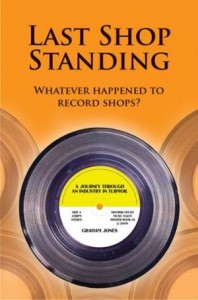
I think it’s fantastic that you’ve dug your record player out and that’s been the case all over the country at the moment. I was speaking to a turntable manufacturer who was saying that he’s having to take on extra staff to cope with demand this Christmas because the record player is seen as this retro gift.
I work for a record company, that’s my day job, and just 5 years ago we would put less than 5% of releases out on vinyl, but now every single major release that we put out comes out on vinyl, on CD and as a download. I think vinyl has, in a way, turned things around for the independent record store because you’re never going to see the supermarkets rack out LPs next to the baked beans. The CD was a great format for them because it was small, it was compact, and they could rack it out and it wouldn’t take up much space.
I think that people realise the music industry conned everybody really, that’s the only word I can think of. When the CD came out they convinced us all that the quality was better but it was in their interests because what the music industry did was say to the artists “we’ve invented this great new format, but we can’t pay you as much royalties as we’ve been paying you on records”. Of course the music industry wanted to push the CD everywhere because they were paying the artists less money and there was an opportunity for them to sell us all our own record collection all over again.
People treasure records. Johnny Marr says in the film something like “vinyl is like the deluxe version of this crappy little thing, the CD”, which it is. I think it’s like comparing instant coffee with proper coffee, there’s a quality about it. I know myself, in my car, I’ve got CDs that are not in their cases – I’ve listened to it and just put it in the glove compartment so it’s not in its case. I’d never dream of doing that with a record, that you actually treasure.
The lesson is clearly that the independent stores have got to offer things that you’re not going to get at the supermarket. Many of them do that anyway, with the service and making it a good shopping experience, and that’s what so many record stores are doing now. If you go in they serve coffee, they’ll have chairs, they’ll have magazines for you to read and lots of local events. The shops have had to make their stores a place where people will meet and make it a great shopping experience, part of the community really.
The subtitle of the film is “the rise, fall and rebirth of the independent record shop”. What have been the qualities of that rebirth and what do you think we could learn from the rebirth of independent record shops? What can it teach us about the rebirth of local economies in the wider sense do you think?
What’s happened is we’ve gone from 2,200 record stores to 280 now, which actually is an improvement on 2009 where more record stores have opened over the last few years than actually closed down. You’ve got to think first of all, all the record stores that vanished, many of them weren’t offering great service, many of them were just relying on the major record companies.
Many people who shop in record stores can remember many record shops where you probably felt a little bit uncomfortable when you went in, they were not welcoming. Those times have changed since the demise of Woolworths. Lots of people used to shop at Woolworths, they’d go in and buy Daniel O’Donnell and artists like that. Most record shops 5 or 6 years ago wouldn’t stock that sort of product but now they do, because they have to cater for their whole community. They can’t be niche and just cater for a certain type of the community really.
What’s your favourite record shop and why?
I can’t say, because I once made the huge mistake of saying that on Radio 2, and the next day about 7 record shops got back to me saying that they thought that they were my favourite record store! The nice thing about record shops for me is that they are independent, so every one is different. Every record shop I go into, I’ll discover something different.
A great example is when we did the filming of the shops for the film, between myself and the producer and the camera man and the sound man, we spent over £500 on records whilst we were touring the country. And that’s a great example as all four of us set off on the journey, never intended to buy any records or anything, but just while we were waiting, while somebody else was filming or in a free moment, we’d flick through the racks and find things. For me, that’s the joy. Every shop is different and you’re always going to find something that you like.
I always loved that thing when I was about 14 of going in to buy some particular record that I wanted to buy and taking it up to the counter and the person behind would say “you don’t want to buy this shit! You want to listen to this!” And proceed to play some life changing, incredible thing you’d never have come across otherwise …
Again, there’s lines in the film … I think Ashley from Spillers says that nothing beats giving somebody something over the counter and saying “have you heard this?” and it’s so true, when that person comes back and goes “wow” it’s absolutely fantastic – that’s what record stores do. There’s no hype, people have not paid for marketing space in the stores.
The nearest supermarket to me is a Sainsbury’s and next to the tills they’re always racking out one CD that they’re promoting. Of course it’s always something like Darius or Liam Jackson or Alexander Burke or some X Factor failure. That’s always their big priority. I can remember record stores pushing Adele when she first came out, Florence and the Machine, whichever band made it, unless it’s a TV reality type thing it’s normally the independent record store that’s picking up on it first and promoting it first.
I remember Revolver always used to have this blackboard outside with ‘new in this week’, all sorts of exciting stuff all handwritten in chalk. I could never walk past without going in …
That’s a great example. I would always go to Bristol and visit 6 record stores in a day. Now I go to Bristol and sell to one record store, that’s how times have changed, how tough it has got for independent record stores.
What I love about the film is that you don’t propose that somehow record shops and independent shops should be pickled in aspic as a national treasure, or that they should be protected from predatory markets. The tone of the film is very upbeat and that actually on their own terms they’re coming out fighting and finding a new way of doing things. In the wider context I suppose there’s all the upsurge of micro-breweries and pop-up shops and all those kinds of businesses very much along the same lines. Do you get a sense that in the rebirth of the independent record shop there’s a wider message for the economy?
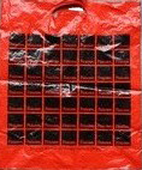
The only photos of anything to do with Revolver Records that I could find online, a picture of one of their rather fetching carrier bags, circa. 1984 or so.
I think what we’re trying to do with the film, and it’s definitely worked to that extent, is we wanted people to go back into a record store and check it out. If you’ve not been to a record store for a long time, go in and check it out, because these guys have been having an unfair playing field for many many years. With the scrapping of the low value consignment release they’re now playing for the first time on a virtual level playing field.
It’s also that we just felt that there’s a movement of people who want to support independent businesses. We’re sick of the big companies with their tax avoidance and their limited choice, and trying to force you to buy things that they want you to buy as opposed to what you’re trying to buy.
With the film, we weren’t saying you must only buy your stuff from an independent record store. What we were saying was, when you’re buying music, the independent record store should be part of the way we buy our music.
There’s nothing wrong with downloading and if people want to listen to Spotify then that’s great, they’re all good things. But it goes back to downloading versus buying a physical product, it’s like the difference between instant coffee which I drink and proper coffee which I much prefer.
I’d like to think that anybody who sees the film and they run an independent business or are involved in an independent business, it would inspire them to feel that there’s so much warmth out there for independent businesses. The one thing I’ve found from doing the film is that there are thousands and thousands of people like me who want to shop in an independent store and whose music taste goes beyond the X Factor!
Here in Totnes we’ve got The Drift Record Shop who are fantastic. One of the best record shops I’ve ever been to and they’re just in our little town here. They’re wonderful.
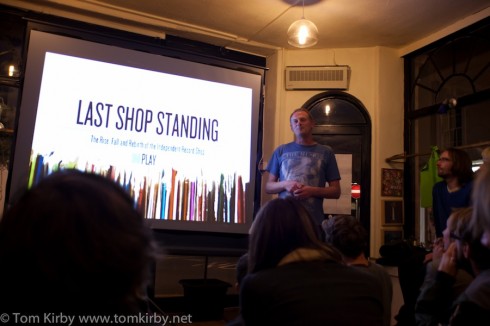
Graham Jones introducing ‘Last Shop Standing’ at a screening at the Drift Record Shop in Totnes a couple of months ago. Credit: Tom Kirby.
Fantastic. This week there’s a new record shop opening in Plymouth. A couple of weeks ago there’s a new record shop open in Cambridge. It’s hard to believe that a university city like Cambridge hasn’t had an independent record shop for 5 years. People are seeing there are opportunities in the country to open a record store if you’re in a town that will have a demand for them. I generally feel that the numbers are going to stay a bit similar to what they are at the moment. I think the decline has definitely been halted. Between 2005-2009, 541 independent record stores closed down. Since 2009, we’ve actually had 12 more open than closed, which is fantastic news for me.
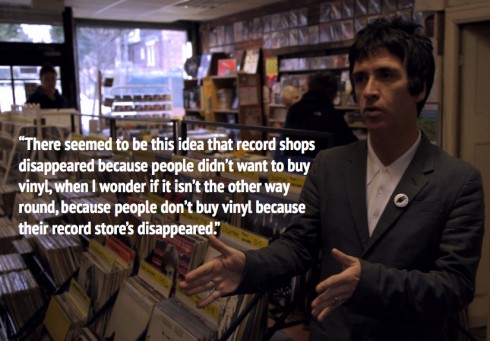
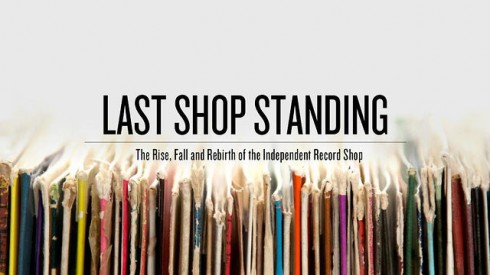
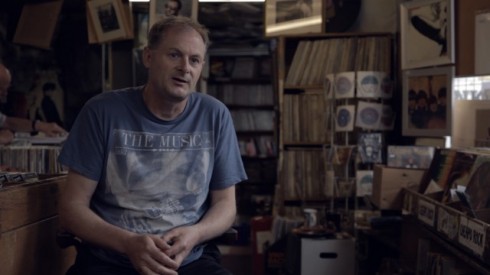
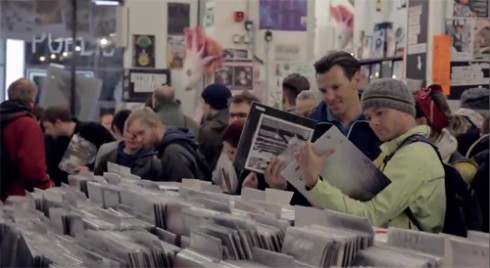
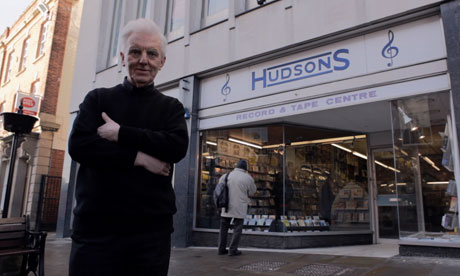
Mike Grenville
3 Dec 3:11pm
Great interview Rob and a great film.
One aspect in the demise of vinyl which isn’t mentioned is the role of record needles. Rather than standardise on a small range of compatible needle formats, the industry choose to make needles and the socket they plug into the player arm incompatible with each other. The result was literally hundreds of different formats that started out as a competitive difference became a millstone. So when sales of vinyl dropped, and the sales of needles began to fall, there was a collapse in the market so that it became impossible to obtain a needle for many record players, forcing a choice between buying a new record player of a CD player. What happened next as they say is history…
Brad Scott
3 Dec 8:33pm
That sounds a great film, which I must catch. On a very similar theme, I’d also recommend Sound in Out about the last record shop in Teesside, and which is available for booking via the British Federation of Film Societies, which is also the best organisation for advice if you’re planning community screenings of any film.
Full disclosure: I am on the board of trustees of BFFS….
Alexis Rowell
4 Dec 7:25pm
We’ve got three independent record shops in Lewes. I love this place!
Alexis